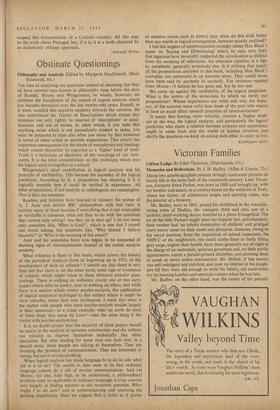Obstinate Questionings
Philosophy and Analysis. Edited by Margaret MacDonald. (Basil Blackwell, 30s.)
THE idea of analysing our questions instead of assuming that they all have answers was known in philosophy long before the days of Russell, Moore and Wittgenstein, to whom, however, we attribute the foundation of the school of logical analysis which has become dominant over the last twenty-odd years. Rnssell, as it were, codified this negative modesty towards the universe. He also contributed his Theory of Descriptions which claims that existence can only rightly be asserted of 'descriptions' or quali- fications; and not of names. In other words, if you state that anything exists which is not immediately evident to sense, you must be prepared to state also what you mean by that existence in terms of other actual or possible experiences. This clearly has important consequences for the whole of metaphysics and theology which cannot thereafter be regarded as a 'higher' kind of truth. Truth is a technique of discovery of the meanings of our state- ments. It is the total concentration on this technique which puts the logical analysts together as a school.
Wittgenstein's chief contribution to logical analysis was his principle of verifiability. This became the mainstay of the logical positivists.. According to it, a proposition has meaning if it is logically possible that it could be verified in experience. All other propositions, if not analytic or tautologous, are meaningless. That is they are nonsense.
Readers and listeners have learned to connect the names of A. J. Ayer and certain BBC philosophers with this view. It worries many of them because if everything that is not analysable or verifiable is nonsense, what are they to do with the questions they cannot help asking? Are they all to shut up? I do not mean only questions like, 'What is God?', which is one that I myself can avoid asking, but questions like, 'Why should I behave decently?' or 'What is the meaning of this poem?'
or emotive noises such as poetry may often do this trick better than any words in logical arrangement, however exactly analysed?
I felt this neglect of communication strongly about Max Black's paper on 'Saying and Disbelieving' where he says very truly that logicians have invariably neglected the signification as distinct from the meaning of utterances. An utterance signifies, is a sign to, somebody, generally somebody else. It is striking that nearly all the propositions analysed in this book, including Max Black's examples, are constructs in an extreme sense. They could never have been said by anybody to anybody. For instance—quoted from Moore—'I believe he has gone out, but he has not.'
We come up against the verifiability of the logical positivists. What is the nature of the sense-data by which we verify our propositions? Whose experiences are valid and why are those, say, of the scientist more valid than those of the poet who makes at least an equal effort towards precision of communication?
It seems that having, most valuably, cleared a 'higher truth' out of the way, the logical analysts, and particularly the logical positivists who claim a relation between analysis and experience, ought to come back into the world of human relations and clarify the questions we keep on asking each other in order to live.
KATHLEEN NOTT


































 Previous page
Previous page